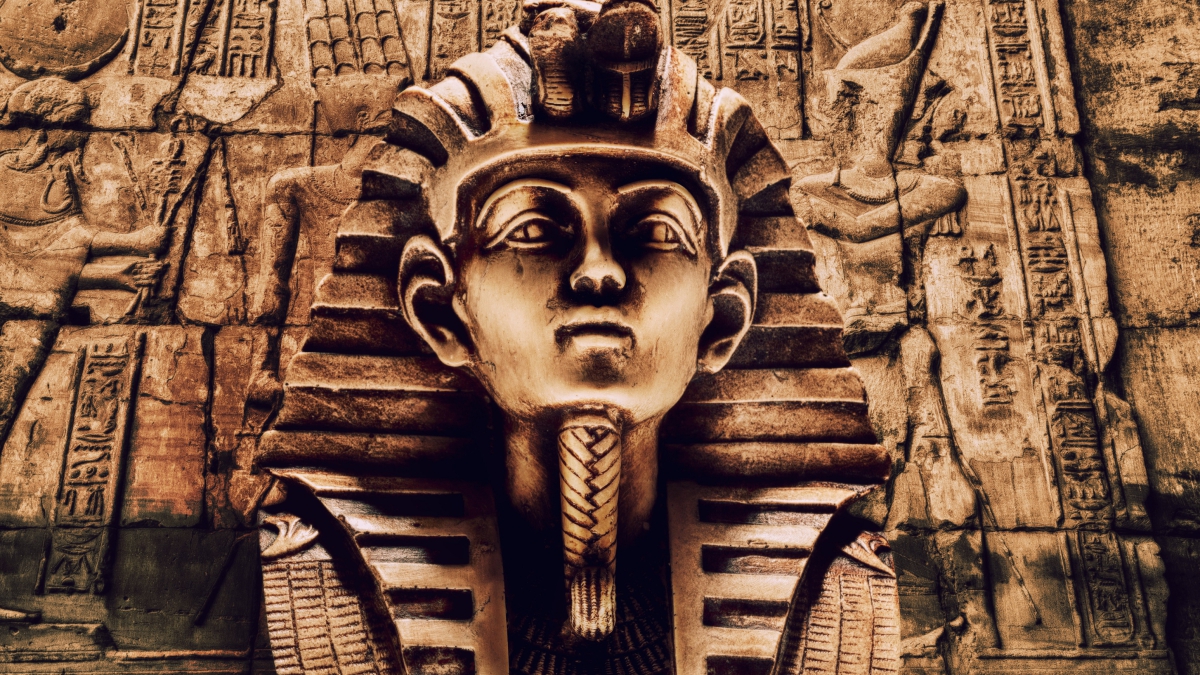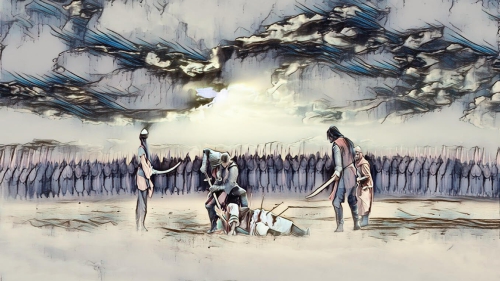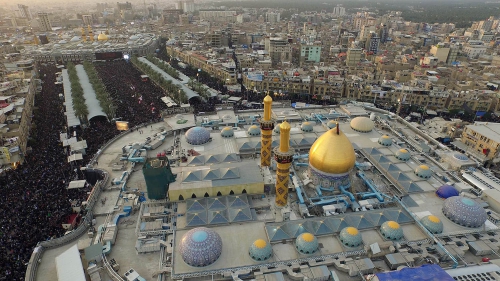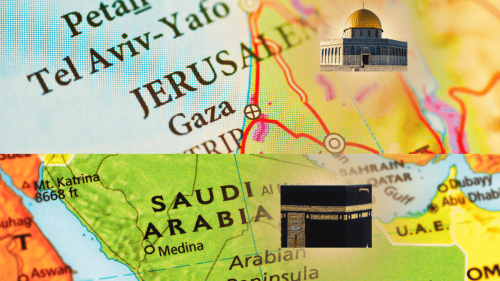Exposing Pharaoh

The Qur’an reveals that among the family of Pharaoh there was a believing man who concealed his faith. In such a state, he followed Prophet Musa and practiced his divine message (Ghafir, 28).
When the animosity of Pharaoh towards Musa reached its climax, and when he and his elites plotted to kill him, the man became outraged. He could not hold back anymore. He met Pharaoh’s evil designs with a barrage of common-sense arguments and sincere counsels.
The case of this believing man is presented in surah (chapter) Ghafir, verses 28-45. The same surah is also called al-Mu’min (the Believer) after the man.
The following are two takes on the contents of the given arguments and counsels.
First: lies stand no chance against the truth
The man said to Pharaoh and his people: “Do you kill a man (merely) because he says: ‘My Lord is Allah’ while he has brought you clear proofs from your Lord? And if he should be lying, then upon him is (the consequence of) his lie; but if he should be truthful, there will strike you some of what he promises you. Indeed, Allah does not guide one who is a transgressor and a liar” (Ghafir, 28).
The man told Pharaoh that all the hullaballoo concerning Musa’s situation was incomprehensible. They accused Musa of being a liar, a fraud, a magician and a contemptible wretch who could hardly express himself clearly (al-Zukhruf, 52), yet they feared him to such an extent that Musa became their public enemy number one.
The man argued thus.
You claim that you are in the right and Musa in the wrong. However, your position is extremely weird, yet uncertain. It contains more questions than answers.
If Musa was telling lies, his case would soon collapse on its own, for the life of falsehood is artificial and unsustainable. The dynamics – and truth - of life will expose it sooner rather than later.
Therefore, Musa’s case was not even worth attending to, let alone becoming part of a national paranoia. His lies will eventually prove vain, and all the harm they may generate in the process will be upon him alone.
As a manifest liar, he will be discarded. He will forever court nothing but scorn and contempt. He will be consumed by the space-time subtleties and will in the end be buried under the rubble of history.
The best way to handle Musa, it follows, was to leave him alone. Whatever little trouble he as a liar and a pretender could cause will be dealt with easily. Pharaoh and his “mighty” state apparatus were built for bigger challenges than that.
Moreover, repelling effortlessly those small troubles could yet contribute to the boosting of the saintly image of Pharaoh and his regime, as well as of the uprightness of his ideology.
In other words, tackling the alleged fraud of Musa should have been taken into national strides, because in the long run it comprised more advantages than disadvantages and more promises than threats.
This is all owing to the fact that lies stand no chance against the truth, nor falsehood against righteousness. The guardians of the truth do not fear falsehood and its proprietors, whoever they may be.
Ideological battles between the two realms are the instances of no contest.
However, that was not the case by any means, prompting the believing man to implicitly turn the tables on Pharaoh.
He implied this to him.
Since you were terrified of Musa and his mission, may it perhaps be that you, as a matter of fact, were wrong and Musa was right?
May it furthermore be that you were manipulators and mischief-mongers, and Musa was a reformer and on the right path, threatening not only your careers, but also your very existence?
You might have the true answers, but were unprepared to accept and live with them. Your conduct nonetheless was giving you away. If you were suppressing the truth with and in Musa, the same was springing back right within yourself.
Before your confrontations with Musa, you had to confront yourselves first. And failing to defeat yourselves meant that you have no chance against Musa either.
At any rate, the conflict was psychological – and spiritual - more than anything else. From such a mental framework originated each and every aspect of Pharaoh’s dealings with Musa.
Positively, the same framework Musa himself had in mind when he at one point confided to Pharaoh - in the latter’s face - that he actually knew the truth: “You have already known that none has sent down these (signs) except the Lord of the heavens and the earth as evidence, and indeed I think, O Pharaoh, that you are destroyed” (al-Isra’, 102).
The ultimate message of the believing man was that the last thing Pharaoh cared about was the truth. The only thing he had in mind was his egotism and self-indulgence. His personal interests and vain glory were his obsessions.
Hence, Musa and his message of justice and virtue were inappropriate and dangerous. They were proving the biggest impediments.
They signified a principal crime, as the doctrine of “might makes right” prevailed at Pharaoh’s royal court.
While intending to kill Musa, Pharaoh in addition wanted to scapegoat him and his work for the ongoing troubles in the state. He wished to deflect people’s attention from what in reality was going on and who was exactly who in the proceedings.
That is why Musa’s numerous miracles as Allah’s clear signs fell on deaf ears. Pharaoh’s heedlessness and blindness were sui generis (one of a kind).
Musa’s threat was both nationalized and institutionalized. He was accused of scheming to drive the people out from their land, to do away with their most cherished institutions and traditions, and to abolish their exemplary ways of life (Ta Ha, 63).
Pharaoh aimed to publicize the problem as a threat not just to national security, but as well to the Egyptian civilizational model.
In passing, even Prophet Muhammad’s greatest enemies knew who he was and where the truth lay (al-An’am, 33) – and so do most Islamophobes today – but the spirit of Pharaoh’s paradigm must live on and must have its adherents in every age and place.
Second: learning from the failed civilizational experiments
The believing man then said to Pharaoh – and his people: “O my people, sovereignty is yours today, (your being) dominant in the land. But who would protect us from the punishment of Allah if it came to us?” (Ghafir, 29).
“O my people, indeed I fear for you (a fate) like the day of the companies – something like the fate of the people of (Prophets) Noah (Nuh) and of ‘Ad and Thamud and those after them. And Allah wants no injustice for (His) servants” (Ghafir, 30-31).
“And O my people, indeed I fear for you the Day of Calling - the Day you will turn your backs fleeing; there is not for you from Allah any protector” (Ghafir, 32-33).
The man’s words oozed both threats and affections, for although he was a follower of Musa – i.e., he was a Muslim - he nevertheless was a member of Pharaoh’s household.
His statements were prefaced by this rational inference.
He put forward to Pharaoh that since they could not prove that Musa was a liar, nor could they meet his challenges, nor match any of his miracles, they should seriously consider the prospect of Musa being truthful. Why not, and what were the other possibilities to weigh up?
If Musa was speaking the Truth – which was asserting itself by the day, with every advancement he was making in recurring encounters with Pharaoh – then “there will befall you some of that which he (Musa) threatens you with” (Ghafir, 28).
Surely, Pharaoh was running out of time and options.
The man asked him to come to his senses, be wiser and avoid a potential disaster. Why deny the obvious and defy all logic and common-sense? Why to set out on a suicide mission?
Nobody has ever declared a war against the truth and Heaven and emerged the winner. In such conflicts, unquestionably, there is always only one victor.
Allah reminds: “Surely, the party of Allah, they are the victorious” (al-Ma’idah, 56).
“Verily, the unjust and wrongdoers will not succeed” (Yusuf, 23).
“Verily, the disbelievers do not succeed” (al-Qasas, 82).
When all is said and done, Musa was neither an enemy nor an everyday person. Pervasive national systems of injustice and oppression in Egypt were the enemies. They were so entrenched that only an extraordinary heavenly intervention was able to weed them out.
Moreover, neither Pharaoh was the first oppressor in history, nor Musa the first prophet and reformer. The annals of history are replete with similar patterns.
If Pharaoh was powerful and Egypt prosperous, that was at once a test and gift from God. In essence, there was nothing special about it.
In no way was that a sign that God favoured Pharaoh as a person over others, or Egypt as a country over the rest of the world.
God incessantly tries individuals and communities with myriads of tests. Sometimes it is prosperity and power, and at other times it is poverty and weakness. If God tested Pharaoh and his people with the former, the Children of Israel were tested with the latter.
Tests are intrinsically neither good nor bad, and neither favourable or unfavourable. It all boils down to how people respond to them and whether tests are passed or otherwise.
Hence, there was nothing fundamentally new in Pharaoh’s altercations with Musa. It was just another historical episode, albeit with different actors and unique variables.
It was furthermore an opportunity for certain (new) people to succeed or fail, and to rise or fall. They were afforded a chance to inscribe either bright or dark new pages of human history; that is to say, either to make history or become history.
Allah says about this: “And these days (vicissitudes of varying conditions) We alternate among the people so that Allah may make evident those who believe and (may) take to Himself from among you martyrs - and Allah does not like the wrongdoers” (Alu ‘Imran, 140).
The laws of history and civilization-building are obvious as well as permanent. All paradigms rooted in disbelief, falsehood and injustice are doomed to fail, one way or another. History is nothing but their necropolis.
Theirs were failed civilizational experiments, functioning afterwards as mere lessons and signs. They teach future generations not how things are to be done, but rather how they are not to be done.
Topics: History, Pharaoh, Prophet Moses (Musa)
Views: 1709
Related Suggestions

















